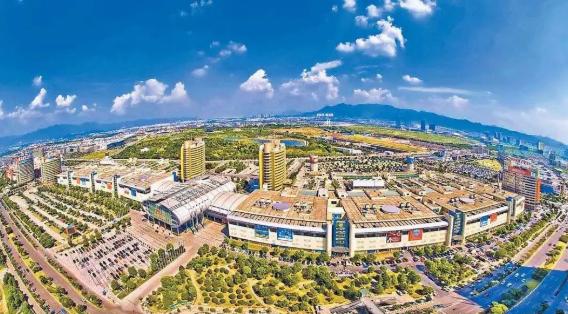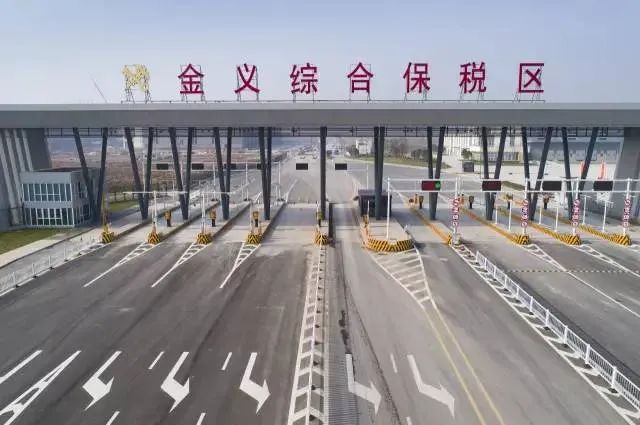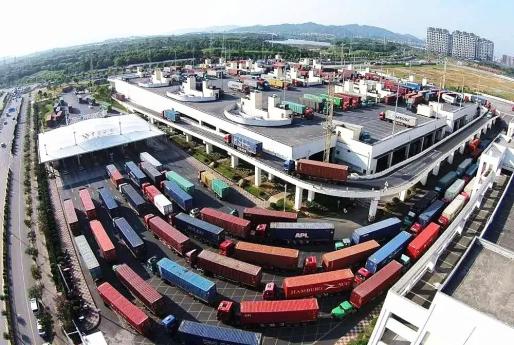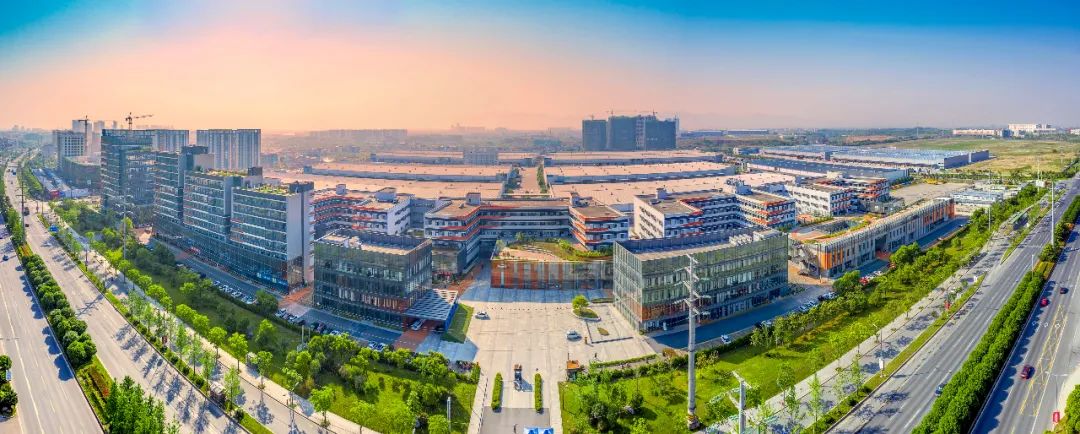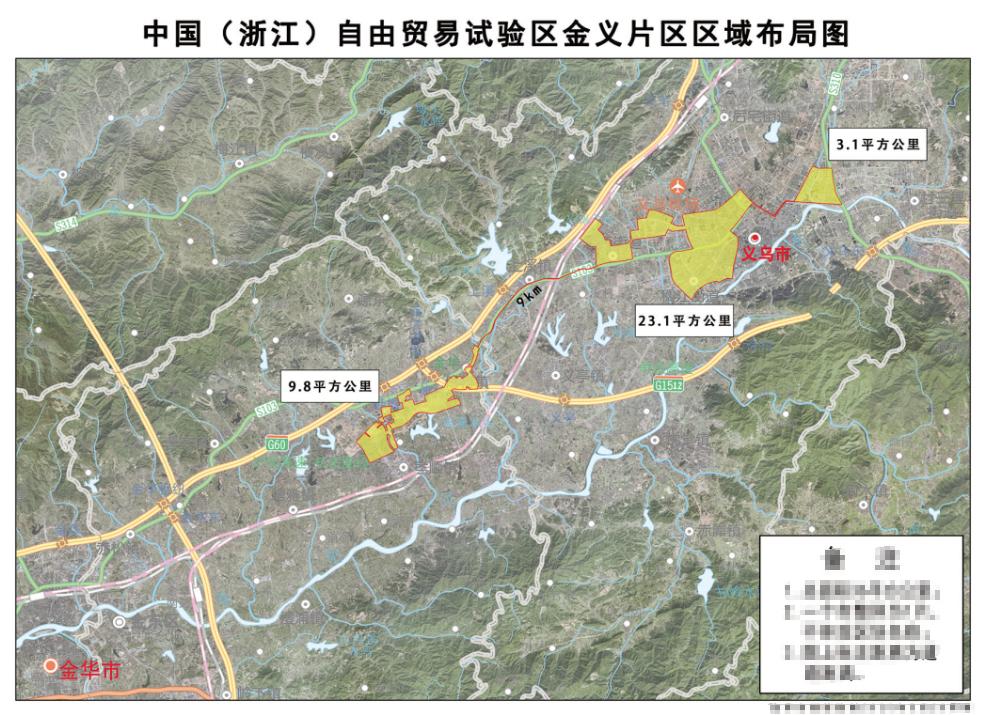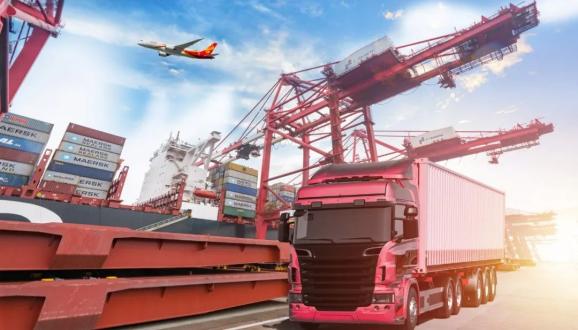| Entering the Era of Pilot Free Trade Zones | |||||||
|
|||||||
On August 30, the Expansion Plan for the Zhejiang Pilot Free Trade Zone (FTZ) was approved by the State Council; on September 24, the Expansion Plan was made official; and on October 26, the Construction Mobilization Conference for the Jinyi Pilot Free Trade Zone of the Zhejiang Pilot FTZ was held. This is how the era of the Pilot FTZ has begun in Jinhua. The expansion plan clearly states and defines the steps to further establish the “World’s Small Commodities Capital,” to build an international small commodities free trade center, a digital trade innovation center, an inland international logistics hub port, a manufacturing innovation demonstration site, and an important platform for open Belt and Road cooperation. The functional location of such a strategic site is Jinyi Urban District.
China’s first pilot free trade zone was established in 2013. To date, 21 FTZs have been established. Different pilot free trade zones have brought about various reforms and continue to strive to achieve further practical results. It is the responsibility of Jinyi Urban District to make contributions in promoting trade and investment facilitation, accelerate the formation of trade powers, promote the strategy of a manufacturing power, and promote the development of the Belt and Road Initiative.
In addition to its original functionality, the expansion of the Zhejiang Pilot FTZ will bring benefit in various areas, including direct, positive influence in Jinhua: - the establishment of a new international trade hub, focusing on the cross-border e-commerce centers of Ningbo, Hangzhou, Jinhua, and Yiwu; as well as purchasing centers, foreign trade-integrated service platforms, and the influential growth of the eWTP. All of these contribute data interaction, business interoperability, service sharing, promotion of digital trade infrastructure, and the creation of global digital trade fairs; - the establishment of an international shipping and logistics hub, focusing on the four major channels of transportation—sea, land, air, and information—based in Ningbo Zhoushan Port, Yiwu Port, Hangzhou Xiaoshan International Airport, and Ningbo Lishe International Airport; - the creation of digital economic development demonstration zones; - the gathering of advanced manufacturing industries.
The establishment of the Jinyi Pilot FTZ of the Zhejiang Pilot FTZ demonstrates the recognition institutions such as the Central Party Committee, the State Council, as well as the provincial Party committee and government, have toward the reform and growth of Jinhua. In recent years, major features of Jinhua were put into the spotlight of developmental plans, including its strategic location, its manufacturing and market, and its environmental and cultural excellence.
At present, Jinhua is welcoming the strategic opportunity provided by the establishment of the Jinyi Pilot FTZ. According to Zheng Wenzhe, member of the municipal Decision-Making and Consultancy Committee, secretary of the Party committee and professor of the Economics and Management College at Zhejiang Normal University, the significance of the Jinyi Pilot FTZ lies in the fact that Jinhua is a crucial growth pole and a major new engine for high-quality development. He believes that the “World’s Small Commodities Capital” is one of Jinhua’s brightest advertisements, through which the FTZ establishment will further improve the convenience of trade liberalization. The FTZ will link finance, manufacturing, physical distribution, culture, and talents circulation. This will eventually lead to a flourishing, high-level economic system. According to the plan, the expansion area of the Jinyi Pilot FTZ is 35.99 square kilometers, including blocks distributed over Yiwu Mall District (3.1 sq km), Yiwu Lugang Port (23.1 sq km), and Jinyi Urban District (9.8 sq km).
According to the industrial plan, the Yiwu Mall District will include an export area which will vigorously develop industries such as digital trade, international business, trading finance, international investment cooperation, and cross-border e-commerce; Lugang Port will evolve into a functional zone for forwarding imported products, as well as science and technology innovation, which will focus on exhibitions and trading platforms for imported goods, modern logistics, creative design, smart urban manufacturing, higher education, digital trade, and other industries; Jinyi Urban District will focus on smart manufacturing and new trade.
The main task of the Jinyi Pilot FTZ is to establish three systems: - one based on investment, as well as trade liberalization and facilitation; - a second one based on the high-quality construction of a modern and open economic system, covering all aspects of trade, finance, logistics, science, and technology; - and a safe and efficient system focusing on risk prevention and control.
For now, Yiwu has identified 10 crucial aspects to carry out in the FTZ in the short term; Jinyi Urban District has planned to implement actions related to the free trade reforms in the next year, focusing on major reforms; and relevant departments are coordinating with each other to launch their missions and accomplish their tasks. In the long process of Jinhua’s reform and development, the establishment of the Jinyi Pilot FTZ is a crucial opportunity for the overall growth of the city, and it will be seized and developed. (By Shao Xuelian—Jinhua Daily, translated by Marco Lovisetto, edited by Kendra Fiddler) 金华,开启“自贸试验区”时代! 8月30日,《中国(浙江)自由贸易试验区扩展区域方案》获国务院批准;9月24日,浙江自由贸易试验区扩展区域挂牌;今天,浙江自由贸易 试验区金义片区建设动员大会召开…… 由此,金华开启“自贸试验区”时代。 打造世界“小商品之都”,建设国际小商品自由贸易中心、数字贸易创新中心、内陆国际物流枢纽港、制造创新示范地和“一带一路”开放合作重要平台,是《中国(浙江)自由贸易试验区扩展区域方案》中明确的金义片区功能定位。 2013年,我国第一个自贸试验区成立,至今已扩容至21个。不同的自贸试验区被赋予不同的改革任务,力争形成更多经验成果。在促进贸易和投资便利化、加快贸易强国建设、推进制造强国战略、推进“一带一路”建设等方面作出金华贡献,是金义片区的历史担当 扩区后的浙江自贸区除了原先的功能定位,还将在四个方面持续发力。其中两个直接与金华有关。 在打造新型国际贸易中心方面 重点发挥宁波、杭州、金华义乌跨境电商、市场釆购、易货贸易、外贸综合服务平台等新型贸易优势,大力发展离岸贸易、转口贸易,支持以市场化方式推进eWTP全球布局,探索在数据交互、业务互通、监管互认、服务共享等方面的国际合作,推进数字贸易基础设施建设,打造全球数字贸易博览会。 在打造国际航运与物流枢纽方面 重点依托宁波舟山港、义乌港、杭州萧山国际机场、宁波栎社国际机场,促进海港、陆港、空港、信息港“四港”联动发展,支持全球智能物流枢纽建设,推动海上丝绸之路指数、快递物流指数等成为全球航运物流的风向标,打造全球供应链的“硬核”力量。 在打造数字经济发展示范区方面 在打造先进制造业集聚区方面 浙江自贸试验区金义片区的设立,是党中央、国务院和省委、省政府对金华改革发展的重视和肯定,尤其是近年来,“区位+规划”“制造+市场”“改革+开放”“生态+人文”的金华优势更加凸显。 如今,我们迎来了自贸试验区金义片区的战略机遇。在市决策咨询委员会委员,浙师大经管学院党委书记、教授郑文哲看来,自贸试验区金义片 区的重要意义,在于金华有了高质量发展的重要增长极、重要新引擎。 他认为,打造世界“小商品之都”是金华最亮的招牌之一,通过自贸区建设,进一步提高贸易自由化便利化水平,将进一步放大我市在国际贸易 中的地位和优势;贸易一头连着金融,一头连着制造,中间还与物流、中介、文化、人力资源等诸多现代服务业紧密相关,将带动建立更高层次更完善的经济体系。 按照方案,自贸试验区金义片区实施范围为35.99平方公里,包括义乌商城区块3.1平方公里、义乌陆港区块23.1平方公里(含义乌综合保税区1.34平方公里)、金义新区区块9.8平方公里(含金义综合保税区1.26平方公里)。 根据产业布局规划 ✦ 义乌商城区块为出口功能区,大力发展数字贸易、国际商务、贸易金融、国际投资合作、跨境电商等产业; ✦ 义乌陆港区块为进口转口、科创功能区,大力发展进口日用消费品展贸平台、现代物流、创意设计、都市智造、高等教育、数字贸易等产业; ✦ 金义新区区块为智能制造、新型贸易。 金义片区的主要任务是建立三个体系 建立以投资贸易自由化便利化为核心的制度体系
高质量建设现代化开放型经济体系,涵盖贸易、金融、物流、科创等方方面面 构建安全高效的风险防控体系 当前—— ✦ 义乌已确定当前10个方面重点工作,开展自贸区“百日攻坚”行动全力抓推进; ✦金义新区谋划实施“自贸启航,冲刺四季度”行动,着力打好重要工作、重大改革、重点项目三大攻坚战; ✦ 相关部门根据职能分工领办工作任务……
我们相信,金华改革发展的历史长河中,自贸试验区金义片区的设立是一个重要时刻,其建设也必将是一部奋斗史,金华人必将用实干苦干抓住这一历史机遇!来源 | 金华新闻客户端作者 | 邵雪廉 罗奕 龚喜燕
|
|||||||
